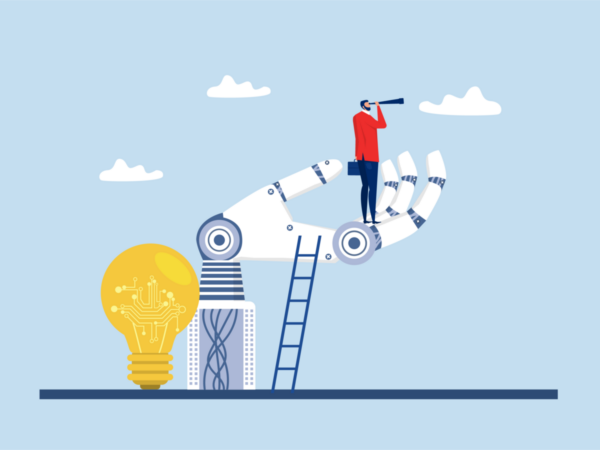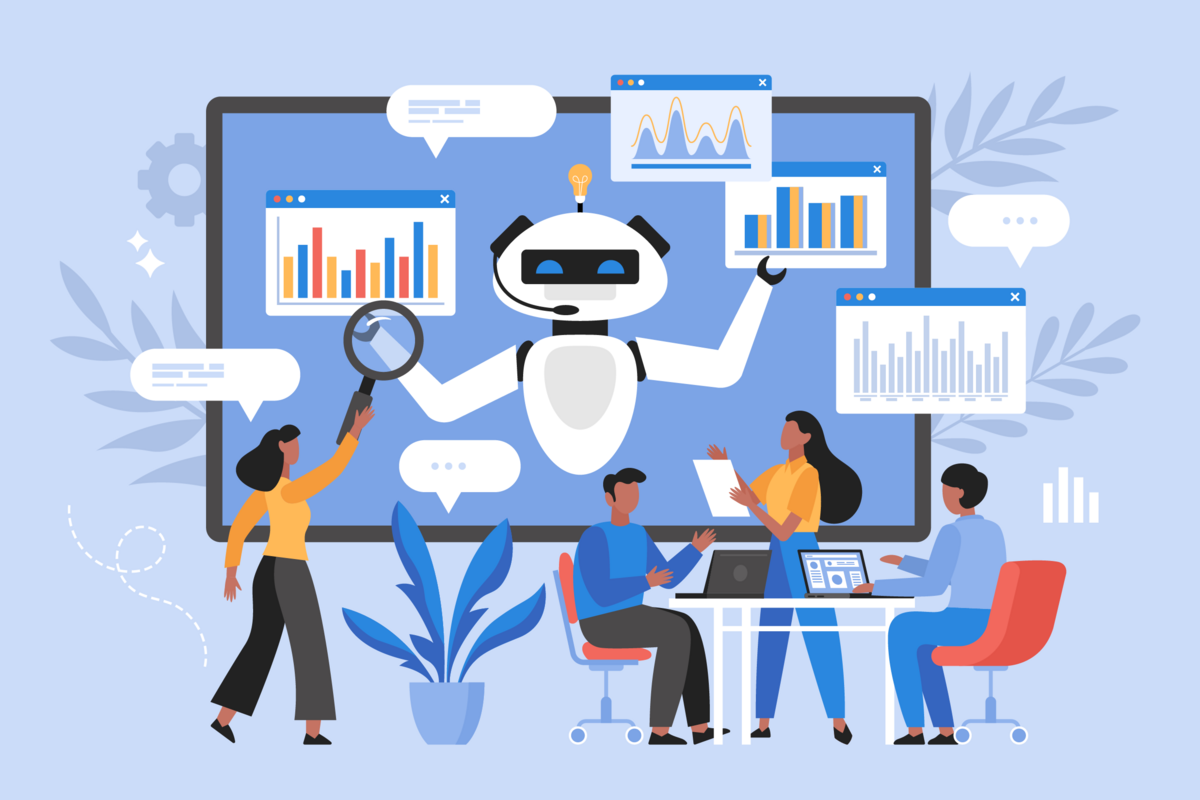Imagine this: you walk into your favorite coffee shop to pick up something to drink.
To your surprise, the barista greets you by name, remembers your favorite order, and suggests a new seasonal treat they think you’ll love.
Now, picture that same warmth and responsiveness infused into every part of your business operations.
Welcome to the world of AI in business—where technology and personalization come together to make your operations run more smoothly and help your brand stand out.
Whether automating tedious tasks, predicting popular trends, or even helping you keep an eye on operations 24/7, AI transforms how businesses work. Discover how you can incorporate AI into your business today to streamline operations and set yourself apart from competitors.
What is Artificial Intelligence (AI) in Business?
Artificial intelligence in business means using smart computer systems that mimic human thinking, decision-making, and problem-solving. These systems can learn from data, recognize patterns, and make decisions—all at lightning speed. Meanwhile, you can focus on creating your strategy, building relationships, and launching new business initiatives.
For instance, many organizations use AI to automate tasks such as data entry or scheduling so employees can concentrate on more meaningful work. However, AI is more than just automation—it’s also a strategic tool that drives customer insights, personalized marketing, and even cybersecurity.
It’s not meant to replace humans, but instead take repetitive, manual work off their plate (that they likely don’t want to do anyway) and empower them with new insights and ideas.
Fun Fact: A study by IBM found that 35% of companies in the US reported using AI in their business, and about 42% are exploring AI.
Understanding AI Technologies
From machine learning to computer vision, there are a range of AI technologies that can help businesses stay informed and efficient:
Machine Learning (ML)
Machine learning is like teaching your computer to learn from experience. After feeding it data, it starts spotting patterns and trends. For example, if you run a retail shop, an ML system could analyze past sales to predict what products will sell best during the next season. It’s like having a crystal ball for your business!
Deep Learning
Deep learning is a more advanced version of machine learning. It can handle more complex tasks, like recognizing faces in photos or detecting fraudulent transactions in real time. Deep learning makes AI even smarter and more precise.
Did You Know? Deep learning mimics the human brain’s neural networks, allowing AI to recognize patterns, make decisions, and even “learn” from experience—just like we do!
Natural Language Processing (NLP)
Ever chatted with Siri or Alexa? That’s NLP in action! NLP helps computers understand and generate human language, which is why customer support chatbots can answer your questions around the clock. It turns text and speech into meaningful data, making interactions smooth and human-like.
Computer Vision
Computer vision allows machines to “see” and interpret visual information. For instance, in manufacturing, computer vision systems inspect products on a production line to spot defects—faster than any human could.
What are the Key Applications of AI in Business?

AI isn’t just a buzzword anymore—it’s proving to transform everything from customer interactions to internal operations. Let’s see how you can apply AI across your business:
Customer Experience & Support
Today, users expect to get help whenever it’s needed, at any time of day or night. AI-powered chatbots and phone systems make this possible by handling or routing customer queries instantly. This means faster responses and happier customers, while freeing up your team to focus on more challenging issues. Plus, sentiment analysis tools can gauge customer mood in real time, allowing businesses to quickly recognize and respond to individual feedback or trends over time.
Fun Fact: According to Zendesk, AI will eventually contribute to 100% of customer interactions.
Marketing and Sales
Ever noticed how online stores seem to know exactly what you might want to buy next? That’s AI working behind the scenes. AI can personalize recommendations and craft targeted marketing messages by analyzing shopping behavior. It segments audiences, predicts trends, analyzes shopping history and patterns, and even automates follow-up emails. That way, your sales team can focus more on closing deals and answering key questions instead of sending constant follow-ups.
Operations and Supply Chain Management
AI is also a superstar when it comes to scheduling, optimization, quality & efficiency. It improves supply chains by predicting demand fluctuations, ensuring inventory levels are just right for that point in time. AI also monitors production lines in manufacturing, spotting defects before they leave the building and catching problems before they turn into major issues.
Information Management & Analysis
Every day, businesses generate a vast amount of data—and with AI, it’s easier to organize and make sense of it all. Smart duplicate detection and data validation can resolve data management inefficiencies. AI solutions also provide intelligent parsing, analysis & routing of digital documents. Whether it helps users interact with data or creates predictive models that predict future trends, AI ensures that the right people have the right information at the right time.
Risk Management
Risk Management is crucial for any business in today’s landscape. AI systems monitor processes and identify anomalies in real-time, flagging unusual system activities and financial transactions. This reduces risk, saving businesses and their customers from potential losses and reputational damage. In addition, AI can proactively identify business risks, such as customer dissatisfaction and employee turnover.
Internet and Data Research
AI tools can review vast amounts of online data to spot trends and provide insights. It’s like having a research assistant who never sleeps, continuously monitoring the digital landscape for you. This helps companies stay on top of market shifts and adjust strategies in real-time.
Digital Personal Assistants
Digital personal assistants powered by AI can transform daily task management. They help schedule meetings, send reminders, and even draft emails, making your workday smoother.
What are the Benefits of Implementing AI in Business?
We’ve already explored how AI can be applied across companies both large and small. But what impacts should you expect to see? Let’s break down how AI can benefit your team, customers, and overall company.
Improved Efficiency and Productivity
By automating more complex tasks, AI frees your team up to focus on the big picture—strategic planning, innovation, and building customer and partner relationships. This not only speeds up tasks and processes, but also boosts overall productivity. More efficiency = more time for creativity and growth.
Enhanced Decision-Making Capabilities
AI processes data at a speed and scale that humans can’t match. With real-time analytics and data-driven predictions, businesses can make timely and informed decisions. This minimizes risks, helping organizations take advantage of new opportunities before competitors do.
Cost Reduction and Resource Optimization
Improved quality and optimized operations reduce labor costs and rework. Over time, these savings add up, allowing you to put more focus on growth and innovation. It’s all about doing more with less—without sacrificing quality.
Better Customer Insights and Satisfaction
By analyzing customer behavior and preferences, AI helps tailor your products and services to meet specific consumer and business needs. This level of personalization increases customer satisfaction, making brand-new clients more likely to turn into long-term, loyal brand ambassadors.
Strengthened Competitive Advantage
Innovation is the key to staying ahead in a crowded industry. AI provides a competitive edge by automating processes, optimizing operations, and offering insights that allow you to outpace competitors. Whether you’re a small business or a large enterprise, leveraging AI can position you as a forward-thinking thought leader in your industry.
Did you know? Studies reveal that implementing artificial intelligence (AI) in business can lead to a 66% increase in employee productivity, which is equivalent to about 47 years’ natural productivity gains in the U.S. labor market.
What are the Risks & Challenges of AI in Business?
New AI technologies are exciting, but you can still face roadblocks during implementation. These challenges show why careful planning is necessary to ensure your business gets the most out of new AI solutions.
Data Privacy and Security Concerns
When you’re handling large volumes of data, you need to have the right security measures in place. AI systems must be secure and compliant with privacy regulations to prevent data breaches. Strong security is also key to maintaining customer and partner trust.
Integration with Existing Systems
Introducing AI into your current operations can be complex. Legacy systems might need upgrades or a complete overhaul to function seamlessly with new AI tools. To ease this transition, you’ll want to complete careful, in-depth planning and implement the integration in phases.
Skill Gaps and the Need for Employee Training
With AI technology rapidly advancing, your team may need new skills. Investing in training and development is essential to bridge the gap and ensure that everyone can work effectively and get the most out of the latest systems.
Ethical Considerations in AI Deployment
Ethical issues such as bias, transparency, and accountability must be addressed when using AI systems. Establishing clear guidelines and monitoring the systems is important to ensure they are used responsibly and fairly.
Financial Investment and Return on Investment (ROI)
Implementing AI solutions can be costly. While the long-term benefits are substantial, businesses must carefully plan their budgets and set realistic expectations for ROI. A well-defined AI strategy and ongoing monitoring can help ensure the solution continues to serve you well.
Note: A 2023 survey revealed that businesses’ greatest challenge when implementing AI initiatives is proving their usefulness due to technology’s rapid evolution and success metrics. However, lack of investment and senior management commitment were the least reported challenges, reflecting the recent strong interest in AI.
What are the Future Trends of AI in Business?

AI is set to become even more integral to business success in coming years. Here’s what we can expect:
Emerging AI Technologies and Their Potential Impact
New advancements in AI, like AI agents and sophisticated hardware & integrations, promise to expand its potential even further. These technologies will not only improve current operations but also open up new business opportunities.
Predictions for AI Adoption Across Various Industries
While large enterprises are already leveraging AI to gain competitive advantages, smaller businesses will soon follow as AI tools become more accessible. AI will likely transform industries like healthcare, logistics, and retail in the next few years.
AI and the Future Workforce
One of the most discussed trends is the impact of AI on jobs. Rather than replacing human workers, AI is set to change the nature of work by automating manual, repetitive tasks and informing decision-making. This will lead to the creation of new roles that focus on managing and optimizing AI systems, as well as jobs that require creativity, strategy, and emotional intelligence—skills that AI cannot replicate.
Greater Focus on Ethical AI and Governance
Ethical considerations will also become front and center as AI becomes more integral to business operations. Companies will need to implement clear guidelines to ensure that AI systems are used transparently, fairly, and responsibly. This includes addressing algorithm biases, protecting user data, and ensuring accountability for AI-driven decisions.
Enhanced Customer Experience Through Personalization
In the future, AI-driven customer experiences will only become more and more popular. With improved data analytics and machine learning, businesses will be able to offer hyper-personalized services and products. Imagine shopping online where every recommendation feels like it was made just for you. This level of personalization will only become more and more common as AI evolves.
Integration of AI with the Internet of Things (IoT) and 5G
Linking AI with IoT and 5G technologies will open new possibilities for real-time data collection and analysis. Businesses will be able to monitor and optimize operations on a much larger scale. For example, smart factories will likely leverage AI to analyze sensor data in real-time, improving performance and maintenance.
What are the Steps to Implement AI in Your Business?
Though AI can revolutionize your business operations, you need to have a strategy in place before getting started. Let’s explore how you can take a clear, intentional approach to AI development & implementation:
Assess Your Business Needs
Take a closer look at your operations. Which tasks are taking up the most time? Where are the bottlenecks? Identifying these areas will help you see where AI can make the biggest impact.
Develop a Strategic Implementation Plan
Set clear objectives and create a plan. Define your goals, budget, and timeline. This plan will serve as your roadmap for integrating AI into your business.
Select the Right Tools
There are many AI solutions out there, but there might be only a few that match your needs. Choose the ones that align with your goals and integrate easily with your existing systems. Whether you choose cloud-based or onsite solutions, make sure they can scale with your growth and follow best practices for security.
Invest in Training
Your team is your biggest asset. Provide them with the training they need to leverage AI effectively. Workshops, online courses, and certifications are common avenues for building expertise.
Pilot Projects and Iterative Improvement
Start small by launching pilot projects in areas where you expect to see quick wins. This helps you test the technology, gather feedback, and adjust as necessary before a full-scale rollout. Make sure you monitor performance closely and refine your AI processes accordingly.
Scale and Integrate Across the Organization
Once you’ve revised and refined your pilot projects, it’s time to scale up. Integrate AI solutions across different departments and functions, ensuring they work well with your existing systems. It’s also important to monitor performance on an ongoing basis, so you can adapt as new AI innovations emerge.
Monitor and Improve
Once your AI systems are up and running, keep a close eye on their performance. Take advantage of analytics and feedback to continuously improve your processes.
Moving Forward
It’s no secret that AI is here to stay and will continue to transform business operations in all kinds of ways. From automating repetitive tasks to providing real-time insights, AI in business provides a competitive edge that can propel your organization into the future.
Curious about how AI can best help your business? Schedule a call with one of our experts for more information.
FAQs
What is the role of artificial intelligence in business?
AI in business is used to streamline operations, automate day-to-day tasks, and provide powerful insights to improve decision-making. It’s like having a supercharged assistant that boosts efficiency and innovation.
What’s the future of AI in business?
When it comes to AI, the future is bright! With emerging technologies and more accessible tools, AI will handle everyday tasks, personalize customer experiences, and drive innovations across industries.
Is AI only for large enterprises, or can small businesses use it too?
Not at all—it’s for everyone! While big companies might have started first, small businesses can benefit from affordable, off-the-shelf AI solutions that improve efficiency and customer engagement.
How does AI in business impact decision-making?
AI processes massive amounts of data quickly and accurately, much faster than humans can. This helps business leaders make more informed decisions, reduce risk, and leverage new opportunities faster.
What are the benefits of AI in business operations?
Key benefits of AI for businesses include improved efficiency, better decision-making capabilities, cost savings through automation, and improved customer insights that lead to higher satisfaction and loyalty.


